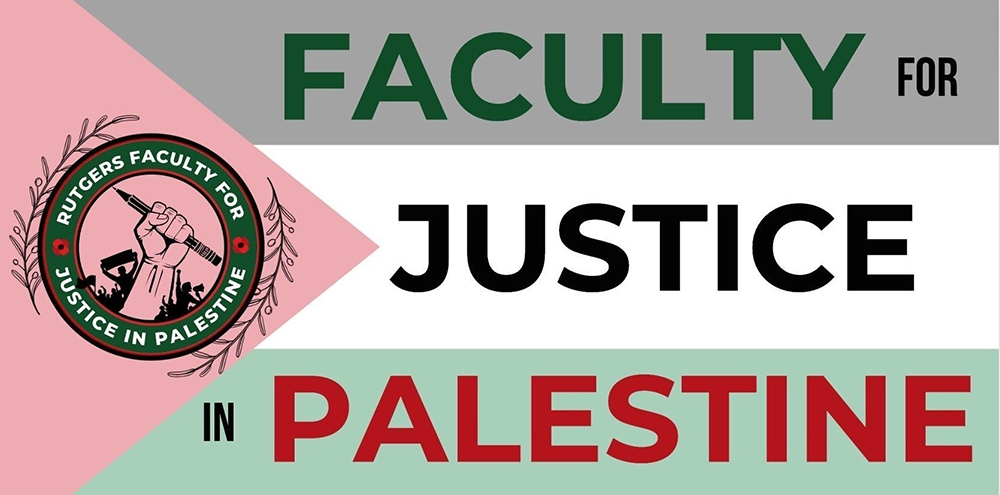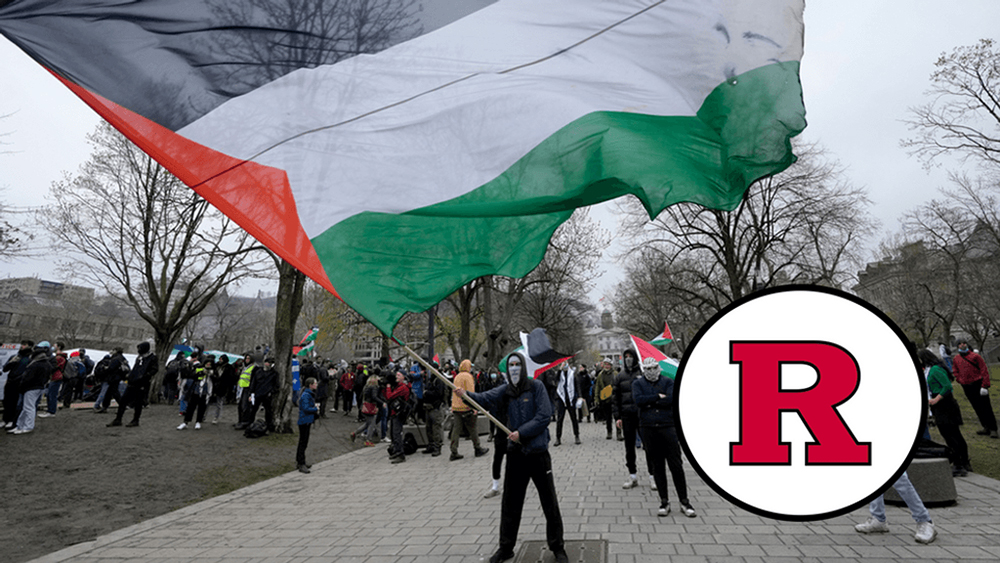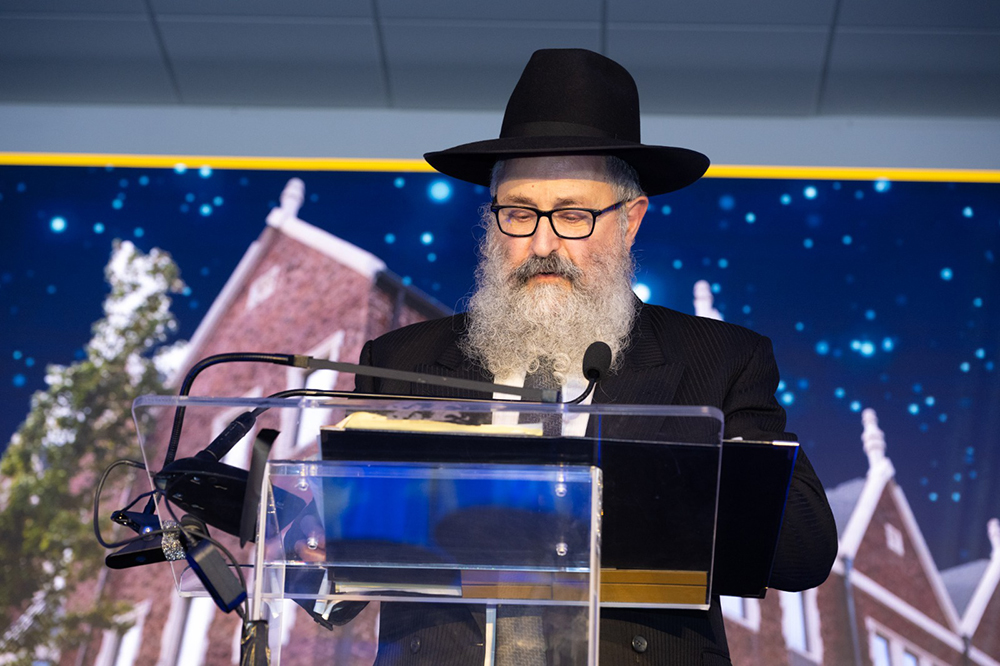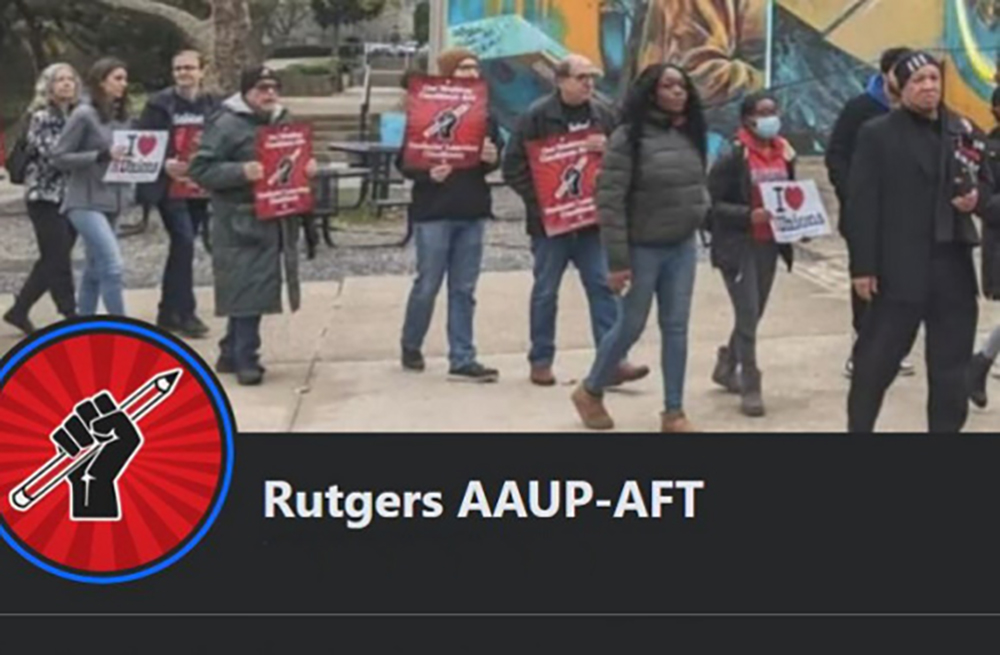|
Getting your Trinity Audio player ready...
|
By: Fern Sidman
Faculty unions at Rutgers University in New Brunswick, New Jersey, have ignited controversy by passing resolutions supporting the Boycott, Divestment, and Sanctions (BDS) movement against Israel, according to report on Thursday in The Algemeiner. The resolutions, backed by the American Association of University Professors (AAUP) and the American Federation of Teachers (AFT) chapters at Rutgers, signal a deepening ideological divide within academia over the Israeli-Palestinian conflict.
As reported by The Algemeiner.com, the Rutgers chapter of AAUP revealed that 58% of voting faculty supported a resolution advocating divestment from corporations linked to Israel and the suspension of all collaborative programs with Tel Aviv University. In parallel, the AFT chapter, representing adjunct professors, reported an even higher approval rate, with 62% voting in favor of a similar resolution. These outcomes illustrate the growing traction of the BDS movement within certain academic circles.
The BDS movement, as described by The Algemeiner.com, was launched in 2005 and explicitly opposes Zionism, the movement supporting Jewish self-determination in their historic homeland. The campaign also rejects Israel’s right to exist as a Jewish nation-state, advocating economic, political, and cultural isolation of the country. Specific guidelines for academic boycotts under BDS prohibit collaborations with Israeli academic institutions and discourage writing letters of recommendation for students seeking to study in Israel.
The joint statement, issued by Todd Wolfson and Bryan Sacks, presidents of the Rutgers AAUP-AFT and the Adjunct Faculty Union, comes after nearly 60% of union members voted in favor of the measure, according to a report on the CampusReform.org website. This development emphasizes the growing intersection of faculty activism, geopolitical issues, and internal campus dynamics at one of New Jersey’s largest academic institutions.

The statement from Wolfson and Sacks frames the resolution within a broader struggle against administrative overreach and anticipated political challenges under a potential Trump administration. “We will need to work together to resist the Rutgers administration’s ongoing attempts to undermine our contract victories,” the union leaders declared. They further emphasized the need for unity, adding, “We will face the consequences at Rutgers of the incoming Trump administration’s looming assault on all of higher education in the coming years. The statement focused on solidarity across faculty ranks, echoing the spirit of their 2023 labor strike: “Together we fight! Together we win!”
The resolution specifically demands divestment from what it refers to as “Genocide in Palestine,” accusing Israel of engaging in “apartheid, ethnic cleansing, and the dehumanization of Palestinians.” As highlighted by CampusReform.org, the measure criticizes Israeli universities for their alleged role in supporting these systems, calling on Rutgers to sever ties with Tel Aviv University. Additionally, the resolution seeks to “disallow any future collaboration on Israeli military or intelligence technology.”
Beyond academic partnerships, CampusReform.org reported that the resolution directs Rutgers and the Rutgers University Foundation to conduct a “comprehensive review of the university’s endowment to identify and terminate investments supporting Israeli state and military operations, Israel’s settler colonialism, apartheid, and genocide of occupied Palestinian territories and the Palestinian people.” This call for divestment extends to corporations allegedly complicit in human rights violations, including Amazon, Boeing, and Lockheed Martin.
The resolution, however, has not gone unchallenged. CampusReform.org noted that prior to the vote, the Rutgers Jewish Faculty, Administrators, and Staff (JFAS) released a detailed statement listing 15 reasons to reject the referendum. The JFAS argued that the resolution is “antithetical to the goal of improving working conditions for Rutgers’ faculty and adjuncts; violates and undermines academic freedom; and discriminates on the basis of nationality, ethnicity, and religion.” These concerns reflect broader criticisms of the BDS movement in academic settings, where opponents argue that such measures foster campus division, alienate Jewish students, and politicize institutional policies.
As CampusReform.org highlighted, the Rutgers AAUP-AFT union represents over 5,000 members who have publicly pledged to use their platform for advancing “the cause of social justice, democracy, and equality.” However, the recent resolution raises significant questions about the intersection of union advocacy and institutional governance. Critics argue that prioritizing geopolitical boycotts over academic collaboration undermines the union’s primary mission of advocating for faculty and student welfare.
The report on CampusReform.org also noted the broader implications of this resolution within the context of rising campus activism across the United States. At many universities, faculty groups aligned with movements such as BDS have played a pivotal role in influencing campus policy, fostering student-led protests, and contributing to prolonged demonstrations. The Rutgers resolution mirrors a nationwide trend where university faculty are increasingly at the forefront of politically charged campaigns that extend far beyond campus borders.

As indicated in the Algemeiner.com report, the group known as “Faculty for Justice in Palestine” (FJP) has been instrumental in promoting the resolution, accusing the university of complicity in “genocide” across numerous social media posts. FJP’s rhetoric has sparked concerns about the broader implications of faculty advocacy for student safety and campus cohesion.
This organization, which has documented ties to Islamist terror groups, has seen a marked increase in activity on college campuses across the United States since Hamas’s October 7th massacre in southern Israel. According to The Algemeiner.com report, the growing influence of FJP has significantly contributed to campus unrest, amplified antisemitic sentiment, and driven efforts to sever institutional ties with Israeli academic and business entities.
This controversy at Rutgers calls attention to broader trends in academia, where debates over free speech, antisemitism, and faculty responsibility are intensifying. The Algemeiner.com report said that recent developments at Columbia University, where a professor who publicly celebrated Hamas’s atrocities on October 7th is now set to teach a course on Zionism. Such incidents have heightened concerns over the extent to which faculty activism blurs the line between academic freedom and the promotion of extremist ideologies.
The report also revealed the findings from a recent AMCHA Initiative study titled “Academic Extremism: How a Faculty Network Fuels Campus Unrest,” which delves into the measurable impacts of FJP’s presence. The study, cited by The Algemeiner.com, identifies a direct correlation between the presence of FJP chapters on campuses and heightened anti-Zionist and antisemitic activity. According to the data, campuses with FJP chapters experience seven times the likelihood of physical assaults on Jewish students and three times the likelihood of threats of violence and death targeting Jewish individuals.
One stark example reported by The Algemeiner.com occurred at Rutgers University in November 2024 when Matthew Skorny, a 19-year-old freshman, used the social media platform YikYak to issue a violent threat. Skorny wrote, “To all the pro-Palestinian ralliers… Go kill him,” referring to an individual he identified as an Israeli fraternity member. Incidents like these, as noted by The Algemeiner.com, underline the dangerous consequences of unchecked faculty extremism and the role FJP plays in radicalizing campus discourse.
The Algemeiner.com report also detailed the prolonged nature of campus encampments demanding a boycott of Israel, known as “Gaza Solidarity Encampments.” According to the AMCHA study, campuses with active FJP chapters saw these protests last over four and a half times longer compared to non-FJP campuses. Faculty members associated with FJP often provided logistical and material support to sustain these encampments, further entrenching divisions and hostility on campus.
Moreover, The Algemeiner.com report draws attention to the AMCHA Initiative’s findings on the increased frequency of faculty protests at FJP-affiliated institutions. Professors at these campuses reportedly spent an average of 9.5 more days protesting than their counterparts at non-FJP institutions. This heightened level of activism reflects a systemic effort by FJP faculty members to embed their ideological agenda into the academic and social fabric of their institutions.
In an interview with The Algemeiner.com, Tammi Rossman-Benjamin, executive director of the AMCHA Initiative, emphasized the role faculty play in fostering antisemitism on campuses. “So much attention has been focused on, for example, Students for Justice in Palestine, the encampments, and all of the unrest. The primary face of that has been students and student groups… but if you look more deeply — behind closed classroom doors, at departmental events, and statements, or the activity of groups like [FJP], you find an even more important predictor and determinative factor precipitating antisemitism,” she explained.
As described in the report at The Algemeiner.com, the findings from the AMCHA Initiative paint a disturbing picture of faculty complicity in fostering hostility toward Jewish students and manipulating campus activism to achieve political ends. The unchecked power of groups such as FJP represents not only a threat to campus safety but also a fundamental challenge to the integrity of higher education institutions across the United States.
The debate over this resolution at Rutgers is far from settled. As reported by CampusReform.org, while proponents frame the resolution as a moral imperative, opponents argue that it sets a dangerous precedent for academic freedom, institutional neutrality, and campus inclusivity. The outcome of this contentious vote will likely reverberate across higher education, influencing similar debates at other academic institutions nationwide.

A Silver Lining to Campus Jew Hatred
In a deeply candid interview with The Jewish Voice, Rabbi Yosef Carlebach, the Executive Director and founding rabbi at Rutgers Chabad House and the Chabad-Lubavitch emissary for all of central New Jersey, expressed grave concerns over the Rutgers faculty unions’ recent decision to pass a Boycott, Divestment, and Sanctions (BDS) resolution against Israel. Calling it “a stain on the reputation of Rutgers,” Rabbi Carlebach attributed the resolution to a culmination of decades-long ideological radicalization among professors, which, he argues, now permeates many corners of higher education.
Rabbi Carlebach did not mince words in describing what he sees as a troubling trend within academia. He argued that many professors, particularly those influencing young, impressionable minds, have adopted an anti-Israel stance without a fundamental understanding of the geopolitical realities of the region. In the interview, he noted, “These professors align themselves ideologically with causes of the alleged oppressed and organize protest movements against the oppressors, and people just blindly hop on board with this egregious propaganda.”
For Rabbi Carlebach, the issue extends beyond Israel itself—it’s a symptom of a larger problem within the academic ecosystem. Professors, he said, often lack even basic geographic literacy about Israel and Gaza, let alone a nuanced understanding of the historical and political context. This ignorance, paired with ideological zeal, creates an environment where misinformation thrives and anti-Israel sentiment is perpetuated without challenge.
To combat the relentless anti-Israel propaganda, Rabbi Carlebach advocates for firsthand exposure to the realities on the ground in Israel. He believes that if critics—be they academics, political leaders, or administrators—were to visit Israel and witness its complexities firsthand, they would see through the “myth” of systemic Palestinian oppression.
In the interview, Rabbi Carlebach shared his proactive approach to addressing these misconceptions. “I have personally invited the governor of the Garden State, congress members, and even the president of Rutgers to visit Israel and draw their own conclusions, rather than ingesting the specious claims of Israel’s detractors.” His invitation calls attention to a central belief: knowledge based on direct experience is the antidote to misinformation.
The broader consequences of unchecked anti-Israel sentiment on campuses go far beyond the confines of lecture halls. Rabbi Carlebach highlighted the long-term stakes, pointing out that today’s university students are tomorrow’s leaders, policymakers, and cultural influencers. “It is necessary for us to rethink how our young men and women are being educated. They are our future leaders, and what they imbibe from their professors and other malevolent actors on campus will not only define the trajectory of the United States but the entire world.”
This sentiment reflects growing concerns across communities that academic spaces are increasingly becoming platforms for political indoctrination rather than centers for objective inquiry and open dialogue. Rabbi Carlebach’s critique suggests that if these trends are not addressed, they risk reshaping societal norms in ways that could have dire consequences.
For Rabbi Carlebach, anti-Zionist rhetoric is not just political speech—it is a modern incarnation of antisemitism. Comparing the platforming of anti-Israel professors to inviting the Ku Klux Klan onto campus, he argued that such rhetoric fuels hatred and division. “To have professors at Rutgers and other prestigious universities be given a platform to promulgate complete falsehoods about Israel and engender hatred towards Jews is analogous to welcoming a division of the Ku Klux Klan (KKK) to campus.”
This comparison highlights the emotional and historical weight Rabbi Carlebach attaches to the issue. He sees the spread of anti-Israel propaganda as a dangerous precedent that could lead to real-world consequences, both on campuses and beyond.
Rabbi Carlebach also pointed to external influences as a key driver of the anti-Israel narrative on campuses. He specifically highlighted the financial contributions made by certain Arab countries to American universities, suggesting that these funds often come with ideological strings attached. “The fact that a great many universities in the US are being handsomely funded by a variety of Arab countries also serves as incentives for professors to teach in a mendacious style as it specifically pertains to Israel.”
This assertion touches on a broader debate about the transparency of foreign funding in higher education and its potential influence on academic integrity and campus culture. Critics argue that such funding can create subtle or overt pressure on faculty and administrators to align with donor priorities, including adopting or promoting anti-Israel positions.
The influence of foreign funding on American academia has remained largely overlooked for years, but recent studies have illuminated a troubling pattern of financial flows and their potential implications. A 2022 study by the National Association of Academics in the United States, as reported by Calcalistech.com in October 2023, reveals that between 2001 and 2021, Qatar funneled an astonishing $4.7 billion into American universities. This financial relationship, initially framed as a gesture to support academic development, is now under intense scrutiny for both its transparency and the ideological impact it may have had on campus discourse.
One of the most concerning revelations from the Calcalistech.com report is that a substantial portion of these Qatari funds went unreported, violating legal requirements set for transparency in foreign donations to educational institutions. The lack of oversight raises pressing questions about the objectives behind such donations. Were they purely academic, or was there an ideological agenda subtly woven into the fabric of campus culture?
The ideological alignment seen in faculty unions passing BDS resolutions against Israel raises uncomfortable questions about the extent to which foreign funding may have influenced not just campus activism but academic frameworks themselves.
In the midst of this challenging climate, Rabbi Carlebach, head of the largest Jewish center in New Jersey for the last 46 years, offers a message of resilience and optimism. Rabbi Carlebach pointed out an unexpected outcome of the surge in antisemitism: Jewish students at Rutgers University are increasingly embracing their heritage and identity.
“There is a huge silver lining to all this hatred directed at Jewish students. Students are now having a banner year at Rutgers, and our program size at Chabad has doubled,” Rabbi Carlebach said.
This shift represents a broader trend: rather than retreating in fear or isolation, Jewish students are turning to their community for strength, solidarity, and a renewed sense of purpose. Chabad has become a refuge and a beacon for these students, offering them both physical safety and emotional support.
Acknowledging the heightened tensions on campus, Rabbi Carlebach praised the cooperation between university and state police, which has led to an increased security p
 resence at Rutgers. This collaboration seeks to reassure students and parents that safety remains a top priority amid the heightened risks posed by rising antisemitism.
resence at Rutgers. This collaboration seeks to reassure students and parents that safety remains a top priority amid the heightened risks posed by rising antisemitism.
Beyond physical security, Rabbi Carlebach stressed the need for a cultural and intellectual response to campus radicalization. According to him, this moment represents “a wake-up call for the entire Jewish community, not only here at Rutgers but throughout the country and the world.”
For Rabbi Carlebach, the response to antisemitic rhetoric on campuses must be twofold: first, to ensure the safety and well-being of Jewish students, and second, to counter misinformation with truth. He emphasized the importance of presenting the reality of Israel to combat the “egregious propaganda” that dominates many academic spaces.
“We must work together to extinguish the pernicious forces of hate and division, and we need to coalesce to propound the truth about Israel and the entire Jewish nation. By doing so, these professors who align themselves with Hamas and Hezbollah will realize how wrong they were,” he said.
As the festival of Chanukah approaches, Rabbi Carlebach offered a poignant reflection: “Light will come out of this darkness, and we will see miracles as in days of old.” His words carry a message of resilience and hope—a belief that despite the challenges, the Jewish community and its allies will rise above hatred, misinformation, and fear.
Rabbi Carlebach’s insights provide a roadmap for moving forward: building strong community ties, promoting education based on truth and firsthand experience, and ensuring the safety and well-being of every student on campus.



